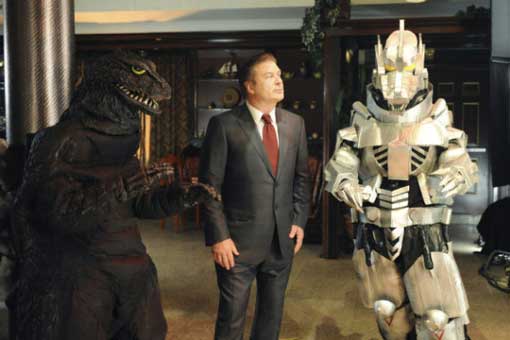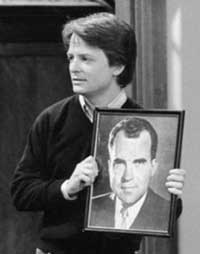
When a good pitcher relies too often on his best pitch and telegraphs its delivery, that fast ball, curve or slider loses much of its effectiveness. The same loss can happen on TV comedies when the people in power -- writers, producers, network executives -- play too often to a popular character's quirkiness.
Consider the cases of Alex P. Keaton and Jack Donaghy.
Alex was, of course, the Family Ties character played to Emmy-winning level by Michael J. Fox, while Jack has been an Emmy-winning role on 30 Rock for Alec Baldwin.
These two exceptional actors share other distinctions. From 1982 to 1989, Fox's character won deserved attention as the ultraconservative son of two once-hippie parents. His idol worship of Nixon, Agnew, Reagan and Bush and his fierce devotion to capitalism became primary ingredients of the series. Since 2006, Baldwin has been playing a later-issue version of the same red-state, blue-chip male.
And both, it can be argued, have had those roles painted into corners by over-reliance on caricature.

Family Ties took on some really serious subjects over its seven seasons, handling them with class. Now that the series is running again on the Hub channel's prime-time schedule (Monday-Thursday at 10 and 10:30 p.m. ET), re-watching more than two decades later proves its quality level endures. And the flaws seem just as bad. Whether audiences demanded stories be punctuated by broad strokes of Alex's conservatism, or whether that was a perception of the show's makers, those lines pop up regularly to seem as out-of-place as a saxophone solo in a Mozart concerto.
Similar things happen on 30 Rock. Clever and creative dialogue, delivered by any number of characters, will be building the story in a fun way until the script gives Donaghy a pin-striped line from the right that trips up the tempo. It happens often enough to make one think the writers rely on the same old shortcut again rather than keep trying for a truly fresh alternative.
Whether it's Keaton in the '80s or Donaghy next Thursday, there seems an implied obligation to toss in the character's cliches so viewers don't feel cheated. In reality, leaning on those crutches is a cheat in itself. Actors generally like to expand their characters, and people who love good television love when that happens. Even though characters like Klinger on M*A*S*H, Cliff on Cheers and Phoebe of Friends were created as easy-laugh gimmicks, each developed other sides that delivered nice payoffs.
Left unchecked, television grows cliches like weeds -- even on classy lawns like 30 Rock and Family Ties.
Now you take a turn: Let's hear which series you think let themselves and you down by playing too much to a single breakout character's quirks.